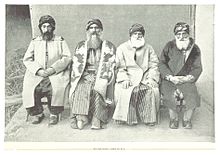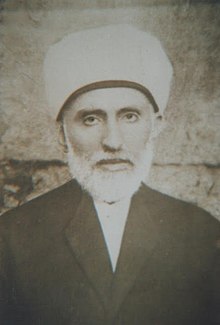Sheikh
Sheikh(/ʃeɪk,ʃiːk/SHAYK,SHEEK,[1]Arabic:شَيْخ,romanized:shaykh[ʃajx],commonly[ʃeːχ],plural:شُيُوخ,shuyūkh[ʃujuːx])[a]is anhonorifictitle in theArabiclanguage, literally meaning "elder".
It commonly designates atribal chiefor a Muslimscholar.A royal family member of theUnited Arab Emiratesand some other Arab countries, also has this title, since the ruler of each emirate is also the sheikh of their tribe.[2]
It is also used as an honorary title by people claiming to be descended (either patrilineally or matrilineally) fromHasan ibn AliorHusayn ibn Ali,grandsons of the IslamicprophetMuhammad.[citation needed]
In some countries, it is given as asurnameto those of great knowledge in religious affairs, by a prestigious religious leader from achainofSufischolars.[citation needed]
The word is mentioned in theQur'anin three places: verse 72 ofHud,78 ofYusuf,and 23 ofal-Qasas.
Etymology and meaning
[edit]
The word in Arabic stems from atriliteral rootconnected with aging:ش-ي-خ,shīn-yā'-khā'.The title carries the meaning leader,elder,ornoble,especially in theArabian Peninsulawithin theTribes of Arabia,whereShaikhbecame a traditional title of aBedouintribal leader in recent centuries. Due to the cultural impact ofArabcivilization, and especially through the spread of Islam, the word has gained currency as a religious term or general honorific in many other parts of the world as well, notably inMuslim culturesinAfricaandAsia.[citation needed]
Sufi term
[edit]
InSufism(tasawwuf), the wordshaikhis used to represent a spiritual guide who initiates a particular order (tariqa) which leads toMuhammad,although manysaintshave this title added before their names out of respect from their followers. A couple of prominent examples are SheikhAbdul Qadir Jilani,who initiated theQadiriyyaorder, and SheikhAhmad al-Tijani,who initiated theTijaniyyahSufi order.[3]
Regional usage
[edit]Arabian Peninsula
[edit]
In theArabian Peninsula,the title is used forchiefs of tribes.This also includesroyaltyin most ofEastern Arabia,where the royal families were traditionally considered tribal chiefs. For example, it is used by the UAEAl-Nahyan dynastyandAl Maktoum dynasty,who are considered the chiefs of theBani Yastribe, and byKuwait'sAl Sabah dynastyandBahrain'sAl Khalifa dynastyof theBani Utbahtribal confederation. The term is used by almost every male and female (Sheikha) member of the royal houses of the UAE, Bahrain, Qatar, and Kuwait. The title is not used by members ofAl SaudofSaudi Arabia,where the title "Prince" (Arabic:أمير,romanized:ʾAmīr) is used instead.[citation needed]
The title is also used to refer toreligious leadersfor both Sunni and Shia Muslims. For example, the Saudi Arabian familyAl ash-Sheikh(literallyHouse of the Sheikh) is named after the religious leader and eponymous founder ofWahhabism,Muhammad ibn Abd al-Wahhab.[citation needed]
Lebanon
[edit]In Mount Lebanon, the title had the same princely and royal connotation as in the Arabian peninsula until theOttomaninvasion in 1516, since it represented anindigenousautonomous "sui iuris"ruler or tribal chief.[4]Examples of some ancient families that hold the title of "sui iuris" sheikh is theAl-Chemorfamily, ruling since 1211 CE inKouraandZghartauntil 1747 CE[5][6]and the Boudib family (descendants of theHashemitefamily) who wereEhdenianrulers ofJebbehsince 1471 CE until 1759 CE. The descendants of this sovereign family now live inMiziara,Mexico and Nigeria.[7]Even the Abu Harmoush family heads, which ruled theChoufregion until theBattle of Ain Darain 1711 CE, were "sui iuris" sheikhs. After the Ottoman rule and the implementation of theIltizamsystem, the title gained anobleinstead of royal connotation, since it was bestowed by a higher authority; in this case the Ottoman appointedEmir,who was nothing more than a mültezim or tax collector for theempire.[8]Some very influentialMaronitefamilies, who had the title bestowed upon them, are (in chronological order): the El Hachem of Akoura (descendants of theHashemitefamily, since 1523), theEl-Khazen(since 1545), the Hubaysh ofKisrawanand theDouaihyofZgharta.Other families who are nowadays addressed or known as "sheikhs" were not traditionally rulers of provinces, but instead they were high-ranking officials at the service of the Emir at that time.
Maghreb
[edit]In theMaghreb,during theAlmohaddynasty, the caliph was also counseled by a body of sheikhs. They represented all the different tribes under their rules, includingArabs,(Bedouins),AndalusiansandBerbersand were also responsible for mobilizing their kinsmen in the event of war.[9]
Horn of Africa
[edit]
In the Muslim parts of theHorn of Africa,"shaikh" is often used as a noble title. InSomalisociety, it is reserved as an honorific for senior Muslim leaders and clerics (wadaad), and is often abbreviated to "Sh".[10]Famous local sheikhs includeIshaaq bin Ahmed,an early Muslim scholar and Islamic preacher,Abdirahman bin Isma'il al-Jabarti,an early Muslim leader inSomaliland;Abadir Umar Ar-Rida,the patron saint ofHarar;Abd al-Rahman al-Jabarti,Sheikh of theriwaqinCairowho recorded theNapoleonic invasion of Egypt;Abd Al-Rahman bin Ahmad al-Zayla'i,scholar who played a crucial role in the spread of theQadiriyyahmovement in Somalia and East Africa;Sheikh Sufi,19th century scholar, poet, reformist and astrologist;Abdallah al-Qutbi,polemicist, theologian and philosopher best known for his five-partAl-Majmu'at al-mubaraka( "The Blessed Collection" ); and Muhammad Al-Sumaalee, teacher in theMasjid al-HaraminMeccawho influenced many of the prominent Islamic scholars of today.[11]
South Asia
[edit]
In thecosmopolitanhub of theSouth Asiansub-continent, it is not just an ethnic title but also often an occupational title[12][13]attributed to Muslim trading families. After the advent of Islam inSouth Asia,many Hindu-Buddhists clans from different castes converted to Islam and adopted the title.[14]In thePunjab region,IsmailiPirsgave some converts, as well asMuslimswhoemigratedfromCentral Asia,especially after the barbaricMongolconquests, thehereditarytitle ofIsmaili Shaikhs.[15]
Southeast Asia
[edit]InIndonesiaand other parts ofSoutheast Asia,sheikhs are respected by local Muslims. InIndonesia,the term is usually spelled "syech", and this is usually attributed to elderlyulama.Higher knowledgeable people of Islamic studies in Indonesia are usually referred to as "ustad"or"kyai".[citation needed]
Iran
[edit]From the perspective of Iran, the word or title of sheikh possesses diverse meanings, among individuals who are aged and wise, it has been an honorific title used for elders and learned scholars, such as: Sheikh al-RayeesAbu Ali Sina,SheikhMufid,SheikhMorteza Ansari.In the past, Islamic scholars who were the Muhammad's descendants, were calledSayyid/Seyyedinstead of sheikh.[16]
For women
[edit]Historically,female scholarsinIslamwere referred to asshaykhah(Arabic:شيخة) (alt.shaykhat). Notableshaykhainclude the 10th-centuryShaykhah Fakhr-un-Nisa Shuhdah[17]and 18th-century scholarAl-Shaykha Fatima al-Fudayliyya.[18]In 1957, Indonesian education activistRahmah el Yunusiyahwas awarded the title ofsyeikahby the faculty ofAl-Azhar University,the first time the university had granted the title to a woman.[19]
A daughter, wife or mother of a sheikh is also called ashaykhah.Currently, the termshaykhahis commonly used for women of ruling families in the Arab states of the Arabian Peninsula.[20]
See also
[edit]Notes
[edit]- ^Also romanizedsheekh,sheyikh,shaykh,shayk,shekh,shaik,shaikh,andcheique
References
[edit]- ^"sheikh".Oxford English Dictionary(Online ed.).Oxford University Press.(Subscription orparticipating institution membershiprequired.)
- ^"Sheikh Community, Islam Religion, Middle East".webconte.
- ^Abun-Nasr, Jamil M. (2007).Muslim Communities of Grace: The Sufi Brotherhoods in Islamic Religious Life.Columbia University Press. p. 94.ISBN978-0-231-14330-1.
- ^A House of Many Mansions: The History of Lebanon Reconsidered, 2001, Kamal Salibi
- ^Al-Sheikh Al-Chemor Al-Hakum Al-Akoura Al-Hakum Al-Zawyiaby Ignatios Tannous Al-Khoury, Beirut, 1948, pg.123
- ^"Tārīkh al-ṭāʼifah al-Mārūnīyah (Microform, 1890)". [WorldCat.org].
- ^El - Doaihi.A glimpse into the History of Ehden The Most Legendary Ehdenian Battles (2000BC - 1976).
- ^Lebanon's Predicament, 1987, Samir Khalaf
- ^Niane, Djibril Tamsir; Africa, Unesco International Scientific Committee for the Drafting of a General History of (1 January 1984).Africa from the Twelfth to the Sixteenth Century.UNESCO.ISBN978-92-3-101710-0.Retrieved19 February2017– via Google Books.
- ^IFLA Committee on Cataloguing, IFLA International Office for UBC., IFLA International Programme for UBC., IFLA UBCIM Programme (1987).International cataloguing: quarterly bulletin of the IFLA Committee on Cataloguing, Volume 11.The Committee. p. 24.
{{cite book}}:CS1 maint: multiple names: authors list (link) - ^"Scholars Biographies - 15th Century - Shaykh Muhammad ibn 'Abdullaah as-Sumaalee".Fatwa-Online. Archived fromthe originalon 15 September 2012.Retrieved26 August2012.
- ^"Pakistan a country study p149".1975.
- ^Robinson, Rowena (20 February 2004).Sociology of religion p90.SAGE Publications.ISBN978-0-7619-9781-8.
- ^Khanam, Azra (30 August 2013).Muslim backward classes: a sociological perspective.SAGE Publications.ISBN978-81-321-1807-7.
- ^Kaw, Mushtaq A. (January 2010).Central Asia in Retrospect and prospect p406.Readworthy Publications.ISBN978-93-80009-32-2.
- ^Who/what is Sheikh?Archived2023-04-07 at theWayback Machineporseshkadeh Retrieved 28 Oct 2018
- ^"Shaykhah Shuhdah, Fakhr-un-Nisa".Haq Islam.21 April 2013.Retrieved9 February2015.
- ^Siddiqi, Muhammad Zubayr (1993)."Hadith Literature Its origin, development and special features: Women Scholars of Hadith".The Islamic Texts Society Cambridge:117–123.Retrieved23 February2015.
- ^Salim HS, Hairus (2012). "Indonesian Muslims and cultural networks". In Lindsay, Jennifer; Sutedja-LIem, M. H. T. (eds.).Heirs to world culture: Being Indonesian, 1950-1965.Leiden, NLD: Brill. p. 83.ISBN978-90-04-25351-3.OCLC958572352.Archivedfrom the original on 2022-07-03.Retrieved2022-07-01.
- ^Sultan Qaboos Encyclopedia of Arab Names.Sultan Qaboos University. 1985.Retrieved14 May2021.
External links
[edit] The dictionary definition ofsheikat Wiktionary
The dictionary definition ofsheikat Wiktionary
